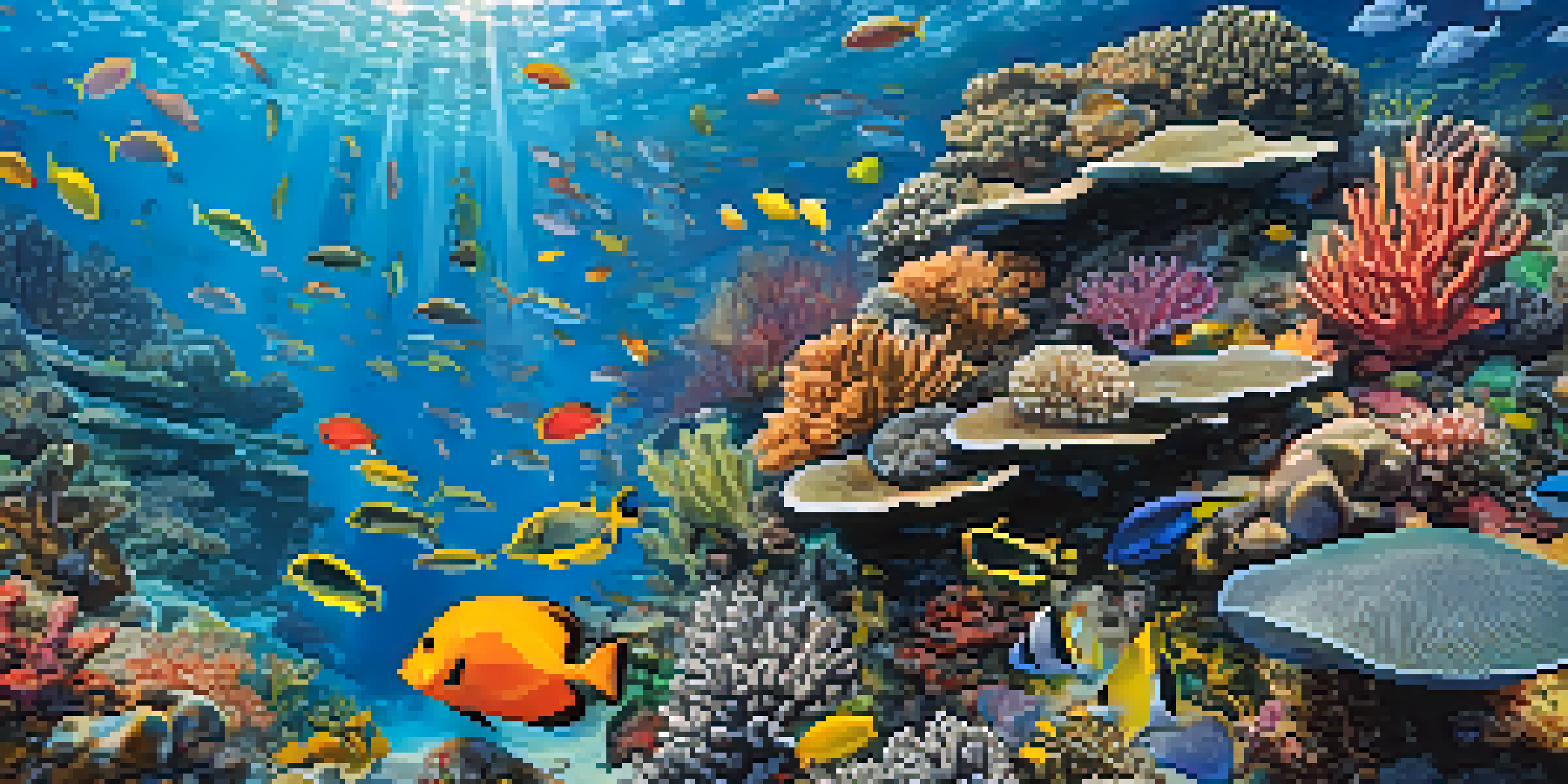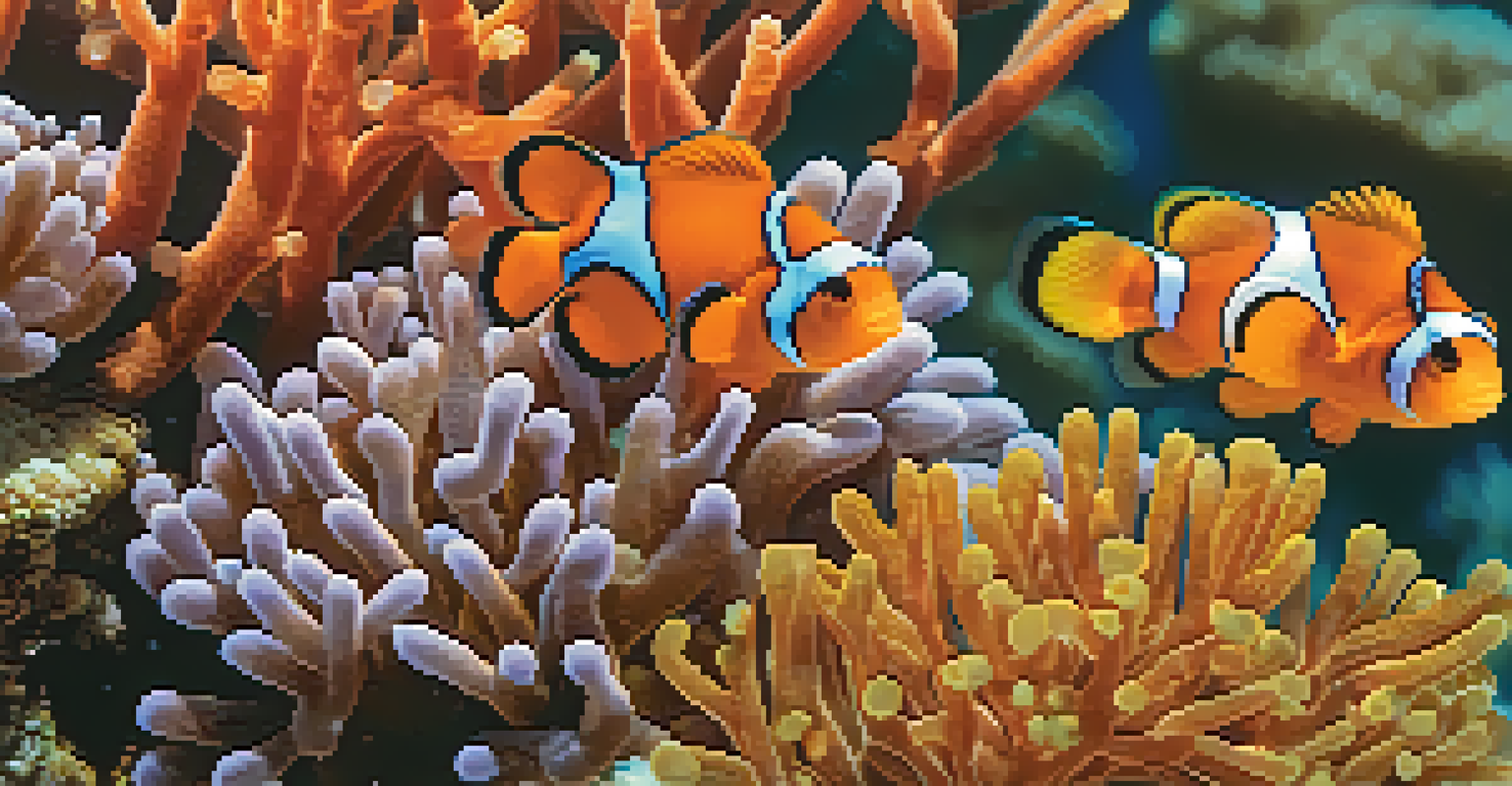Importance of Coral Reefs in Hawaii's Marine Ecosystem

Coral Reefs: The Foundation of Marine Life in Hawaii
Coral reefs are often referred to as the rainforests of the sea, and in Hawaii, they serve as the backbone of the marine ecosystem. These vibrant structures are home to thousands of species, providing shelter and food for fish, invertebrates, and other marine creatures. Without coral reefs, many of these species would struggle to survive, leading to a cascade of ecological consequences.
Coral reefs are vital to the health of the oceans, and they are the foundation of a diverse and productive marine ecosystem.
In Hawaii, the coral reefs cover approximately 40% of the state’s coastal waters, creating a rich habitat that supports both commercial and recreational fishing. They not only sustain marine biodiversity but also play a crucial role in the local economy. Healthy coral reefs attract tourists, contributing significantly to Hawaii's tourism industry, which is a vital part of the state's economy.
Furthermore, these reefs help maintain the balance of the marine ecosystem by producing oxygen and absorbing carbon dioxide. This process not only benefits marine life but also contributes to the overall health of the planet, highlighting the interconnectedness of coral reefs with global ecological systems.
Biodiversity: A Wealth of Life in Coral Ecosystems
Coral reefs are teeming with biodiversity, often supporting more species per unit area than any other marine environment. In Hawaii, you can find a stunning array of fish, crustaceans, mollusks, and other marine organisms, many of which are endemic, meaning they are found nowhere else on Earth. This unique biodiversity is crucial for the resilience and sustainability of the ecosystem.

Each species plays a role in the health of the reef; for example, herbivorous fish help control algae growth, ensuring that coral can thrive. The presence of diverse species also promotes genetic diversity, which is vital for adaptation and survival in changing environmental conditions. This wealth of life contributes to the overall stability of the marine ecosystem.
Coral Reefs Boost Local Economy
Hawaii's coral reefs are vital for tourism and fisheries, significantly contributing to the state's economy.
Moreover, the intricate relationships between these species create a web of interactions that supports the entire ecosystem. From the smallest plankton to the largest predators, each organism is a piece of the puzzle, emphasizing the importance of protecting these habitats to maintain the delicate balance of life.
Coral Reefs and Climate Change: A Fragile Relationship
Coral reefs are among the most vulnerable ecosystems to climate change, particularly due to rising sea temperatures and ocean acidification. In Hawaii, coral bleaching events have become increasingly common, causing corals to expel the algae that provide them with color and nutrients. This not only diminishes their beauty but also threatens the entire ecosystem that relies on them.
The ocean is a central element of the global ecosystem, and coral reefs are critical to its health.
As ocean temperatures rise, the resilience of coral reefs is tested, potentially leading to widespread mortality. This loss can have dire consequences for marine biodiversity and the communities that depend on these reefs for their livelihood. Protecting coral reefs from the impacts of climate change is essential for ensuring the future health of Hawaii's marine ecosystem.
Efforts to mitigate climate change and promote coral resilience, such as marine protected areas and sustainable fishing practices, are crucial. By fostering healthy environments, we can support coral reefs in adapting to changing conditions, ensuring they continue to thrive for generations to come.
The Economic Value of Coral Reefs in Hawaii
Hawaii's coral reefs are not just important for ecological reasons; they also hold significant economic value. The tourism industry heavily relies on these vibrant ecosystems, with activities such as snorkeling, scuba diving, and marine tours attracting millions of visitors each year. This influx of tourism generates jobs and revenue for local communities, highlighting the economic imperative to protect coral reefs.
Additionally, coral reefs support local fisheries, providing a livelihood for many residents. The health of these fisheries is directly tied to the condition of the reefs, as they serve as breeding and feeding grounds for many commercially important species. A decline in reef health can lead to decreased fish populations, impacting food security and local economies.
Biodiversity Supports Ecosystem Health
The rich biodiversity of coral reefs is essential for maintaining ecological balance and resilience in marine environments.
Investing in the protection and restoration of coral reefs is not just an environmental issue but also a sound economic strategy. By prioritizing the health of these ecosystems, we can ensure that future generations continue to benefit from their beauty and resources.
Cultural Significance of Coral Reefs to Hawaiian Communities
Coral reefs hold deep cultural significance for Native Hawaiian communities. They are intertwined with local traditions, practices, and beliefs, often viewed as sacred spaces that provide sustenance and spiritual connection. The relationship between Hawaiians and the ocean is one of respect and stewardship, emphasizing the importance of caring for coral reefs.
Many traditional practices, such as fishing and gathering, are directly linked to the health of coral reef ecosystems. The knowledge passed down through generations emphasizes sustainable practices that honor the resources provided by these reefs. This cultural heritage reinforces the need for conservation efforts aligned with local values and perspectives.
Furthermore, incorporating cultural practices into marine conservation can foster a deeper connection to the environment. By engaging local communities in reef management and protection, we can create a holistic approach that respects both ecological and cultural dimensions, ensuring the preservation of coral reefs for future generations.
Threats to Coral Reefs: Human Impact and Environmental Change
Despite their importance, coral reefs face numerous threats, many of which are driven by human activity. Pollution, overfishing, and coastal development are significant pressures that can lead to reef degradation. In Hawaii, runoff from land can carry sediments and toxins into the ocean, smothering corals and disrupting the delicate balance of the ecosystem.
Climate change exacerbates these threats, pushing coral reefs to their limits. Ocean acidification, caused by increased carbon dioxide levels, weakens coral structures, making them more susceptible to disease and damage. This multifaceted challenge requires urgent action to address both local and global stressors affecting coral reefs.
Climate Change Threatens Coral Survival
Rising sea temperatures and ocean acidification pose serious risks to coral reefs, impacting marine life and local communities.
Awareness and education about these threats are essential for fostering a culture of conservation. By understanding the impact of our actions on coral reefs, we can take steps to reduce our footprint and advocate for policies that protect these vital ecosystems.
Conservation Efforts: Protecting Hawaii's Coral Reefs
Efforts to conserve and restore Hawaii's coral reefs are vital for maintaining their health and resilience. Various organizations and local communities are engaged in initiatives aimed at protecting these ecosystems through marine protected areas, restoration projects, and educational programs. These efforts not only focus on coral health but also on the overall well-being of the marine environment.
Community involvement is key to successful conservation. By fostering a sense of stewardship among residents and visitors alike, we can create a collective responsibility to protect coral reefs. Educational programs that promote awareness about the importance of these ecosystems can inspire individuals to take action, whether through responsible tourism or local conservation efforts.

Additionally, scientific research plays a crucial role in understanding coral ecosystems and developing effective conservation strategies. By combining traditional knowledge with modern science, we can create comprehensive approaches that ensure the long-term health of Hawaii's coral reefs.